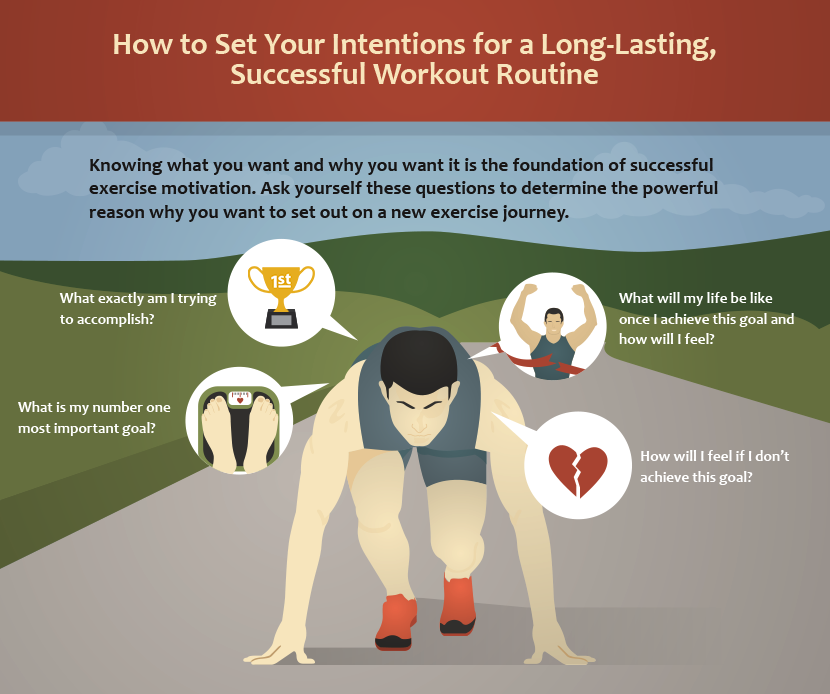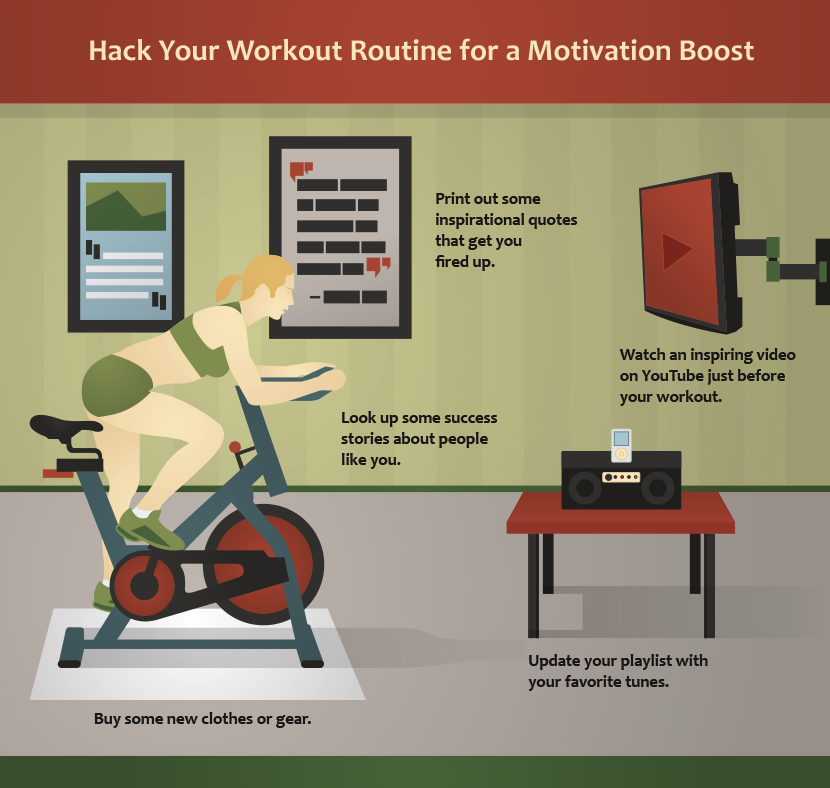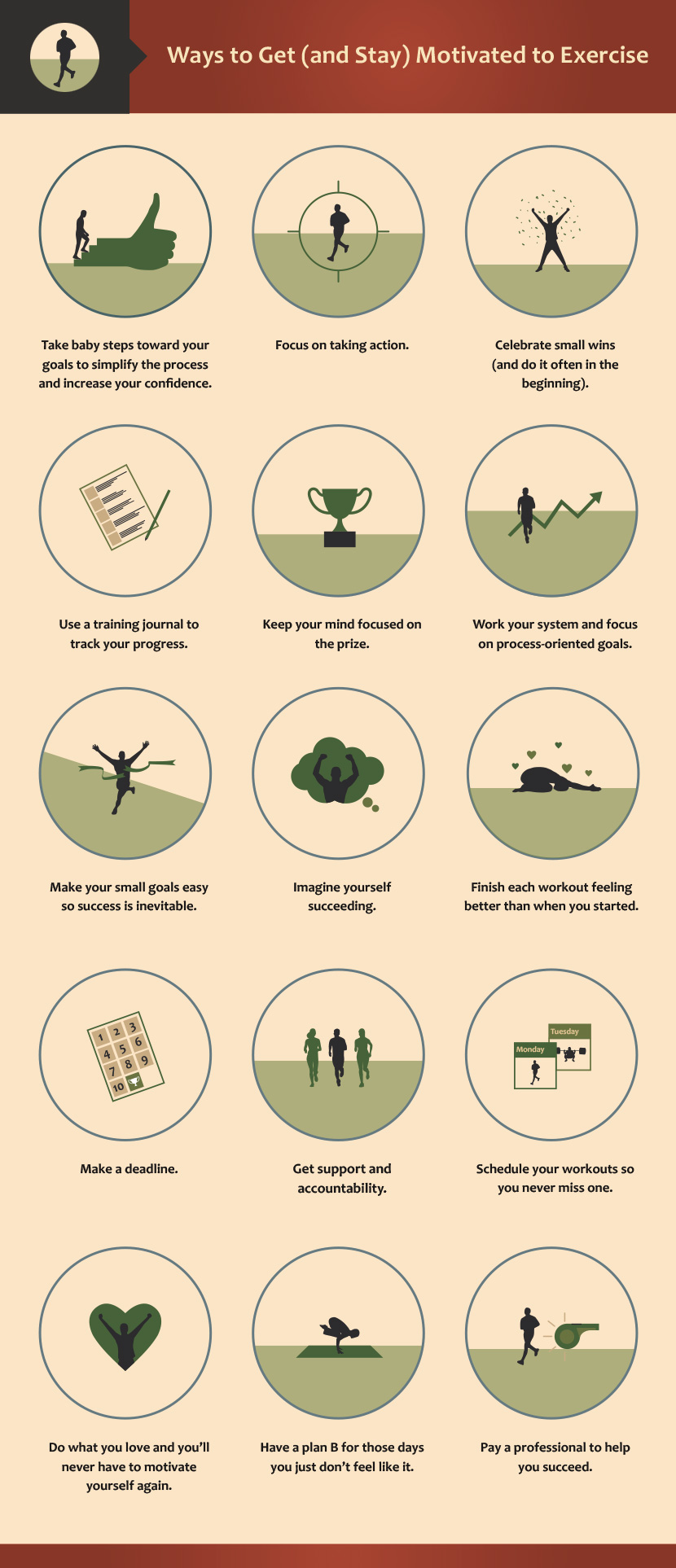Ways to Get (and Stay) Motivated to Exercise
Exercise doesn’t always go as planned. There will be days
(and maybe even weeks) when you simply don’t want to do anything.
This is true even for elite athletes and fitness professionals. But
you can dramatically increase the chances of sticking with a routine
and achieving your goals with the right fundamentals in place and a
solid plan that works even when you really don’t want to work out.
For some people, the exercise habit is so ingrained into daily life that
exercise becomes automatic, despite fluctuating motivation levels. Take for
instance Jim Ryun, the first high schooler to run a mile in less than four
minutes. “Motivation is what gets you started,” he says. “Habit is what
keeps you going.”
But what should you do before the habit is ingrained? And what can
you do on those days when you just don’t feel like exercising? That is
when having a motivation system can be the difference between success
and failure.
Let’s dive into some specific strategies you can use to motivate
yourself to exercise when you really don’t want to.
The One Thing That Will Make or Break Your Success
One critical factor is essential to your success: you have
to know what you want and why you want it. It sounds simple,
but many people don’t have clearly articulated goals, nor
have they identified the personal reasons behind those goals.
Those aren’t just the surface reasons, but the deeply rooted
reasons you want something. If you don’t want it badly enough
you won’t be willing to put in the work, especially when it’s
inconvenient, hard, or boring.
Knowing what you want and why you want it is the foundation
of successful exercise motivation. If you skip this step or don’t
take it seriously, you can forget about implementing the rest of
the motivation strategies below. They may work temporarily, but
your long-term success is less certain. And yet most of the
motivation tips and articles you’ll find online leave out
this critical step.
Sure, you may want to run a marathon or lose 20 pounds – and
those are great goals – but why do you want to achieve them?
If it’s just so that you can “get healthier” or “have more energy,”
those aren’t very compelling reasons. And in a moment of weakness,
those vague goals probably won’t be powerful enough to motivate
your exercise habit.
On the other hand, if you want to be the best spouse, parent,
or friend you can be; if you want to be able to play with your
grandchildren someday; if you want to see what you’re truly capable
of achieving in this short life you’ve been given; or if you
want to serve others to your utmost ability, then you may have
discovered a powerful reason “why” that will carry you through
some of your toughest days and help create your inner strength.
Figure this out and write it down. Ask yourself:
- What exactly am I trying to accomplish?
- What is my number one, most important goal?
- Why is this important to me?
- What will my life be like once I achieve this goal and how will I feel?
- How will I feel if I don’t achieve this goal?

If you don’t already know the answer to these questions,
take time to set your intentions before you implement any
of the following strategies.
18 of the Most Effective Ways to Motivate Yourself to Exercise
There is not just one motivational trick that works for everyone.
Keep in mind that some of the following strategies will work better
for you than others. The more personalized strategies you integrate
into your plan, the more likely you’ll succeed.
Read through the list and pick out the pieces of advice that:
- a) You’re absolutely sure you can implement
- b) You think will make the biggest difference for you personally
Ready? Let’s do this.
1. Take baby steps toward your goals to
simplify the process and increase your confidence. Baby steps are the
building blocks of habits. And then once you have habits in place,
motivation strategies will no longer be as crucial to your success.
Know what your end-goal is, then focus on the small steps you need
to take to get there.
If you make the necessary tasks simple enough, then chances are
they’ll be easier to accomplish. When you do succeed with each baby
step, you’ll feel more motivated to keep going. Whatever you decide
on, make it realistic so you can put in the work each day.
2. Focus on taking action. This goes in hand with taking baby steps.
Don’t get stuck in research or planning mode. Instead, move forward with what
you already know and make decisions quickly. Action begets more action.
So it’s okay to allow a little bit of chaos in the beginning. You’ll
figure things out as you go, and get help as needed.http://www.artofmanliness.com/2014/05/19/10-overlooked-truths-about-taking-action/
3. Celebrate small wins (and do it often in the beginning). If your goal
is to get out the door for a 15-minute run two times a week, reward yourself when
you succeed. It doesn’t have to be anything huge. Something as simple as making
your favorite smoothie can help reinforce your positive habits. Take a moment to
reflect and be proud of what you’ve accomplished. Keep in mind that over time,
small wins add up to big victories. Baby steps!
4. Use a training journal to track your progress. Actually seeing your
accomplishments written down in a journal is very motivating. You can look back
and say, “I did something today that I couldn’t do last week.” If you keep this
up for several weeks, months, and eventually years, you’ll start to believe
that anything is possible.
5. Keep your mind focused on the prize. In her TED Talk on why some people
find exercise harder than others, social psychologist Emily Balcetis says her
number one trick to help people exercise is to, “Keep your eyes on the prize.”
Focus on what you’re trying to achieve. If you want to look better, feel better,
perform better, live longer, or get to watch your grandkids grow up, focus on
that every time you think about quitting or skipping a workout.
Recalling that goal, or prize, actually changes our perception of exercise,
making it seem easier. So don’t think about all the work that needs to be done,
how long it’s going to take, or how hard it’s going to be. Just keep your eyes
on the prize.
6. Work your system and focus on process-oriented goals. A goal by itself
is not much more than a wish or a dream. Goals are pretty hard to reach without
putting a system in place. Beyond outcome-based goals (for example, I’m going
to run my local 5k race in 25 minutes or less), set process-oriented goals
(for example, I’m going to go on at least three runs per week and run just a
little better each time). Figure out the day-to-day tasks you need to perform
to succeed.
7. Make your small goals easy, so success is inevitable.
Before you commit to any exercise routine, whether you want to start running or lift weights, ask yourself how likely you are to comply with
your plan. If you’re not 100 percent sure you will follow through,
then make it easier. Once you achieve your first goal, you can set
more challenging goals down the line.
8. Imagine yourself succeeding. Visualization works – and it’s so
powerful, nearly all elite runners utilize this strategy. Visualize yourself
achieving your goals. Make it look easy. Think about how great you’ll look,
feel, and perform. Think about how your life will be better once you implement
an exercise routine and reach your goal. Then see and believe that you can and
will achieve your goals. Even though visualization can give you a competitive
edge, you don’t have to be a superstar to benefit from it. You’ve got an
imagination, so use it! http://sportsmedicine.about.com/cs/sport_psych/a/aa091700a.htm
9. Think about how great you’ll feel when you’ve finished your workout.
Not only will your body be pumping all sorts of feel-good hormones, but you’ll
also feel incredibly accomplished after a run or a workout. You can also think
about (but not dwell on) how lousy you’ll feel if you don’t exercise.
10. Finish each workout feeling better than when you started. If you always
feel exhausted and run down after your workouts, then it’s going to be hard to stick
with them. Working hard is fine, but don’t grind yourself into the ground.
If you do some high-intensity exercise, make sure to do something easier at
the end and include a cool down.
11. Hack your motivation for a temporary boost.
Do whatever you’ve got to do to get yourself pumped and then make the most
of that energy. This is not a good long-term strategy, so use it sparingly.
- Buy some new clothes or gear
- Update your playlist with your favorite tunes
- Watch an inspiring video on YouTube just before your workout
- Look up some success stories about people like you
- Print out some inspirational quotes that get you fired up

12. Schedule your workouts so you never miss one. If it’s important to
you, you’ll make the time for it. Schedule your workouts and treat them like an
important meeting at work.http://strengthrunning.com/2012/12/how-to-schedule-strength-workouts/
13. Make a deadline. Schedule a deadline in conjunction with a
special event like a vacation at the beach (even if it’s just a day), a
reunion, or a big race. If you know you need to be at your best on a
certain date, you’ll make the best use of your time.
14. Get support and accountability. This is the most powerful motivation
strategy there is, even for introverts. Extensive research has shown social support
is a key factor in determining success in an exercise program.http://www.ncbi.nlm.nih.gov/pubmed/21727305
Find a training partner, join a fitness class, or hire a running coach.
There are many forms of online social support, too. Join a forum or
Facebook group. Sign up for a 30-day fitness challenge. The more people
involved with your success, the better.
15. Pay a professional to help you succeed. If you’re extra-committed
and have the means to do so, consider paying someone to help you achieve your
goals. Hire a personal trainer, sign up for a boot camp, or purchase an online
program. If you’re trying to justify the cost, ask yourself, “What is my health
and quality of life worth?”
16. Do what you love and you’ll never have to motivate yourself again. If you
hate running, then don’t run. If gyms intimidate you, don’t join one. Find something
physically active that you genuinely enjoy doing, or even maybe something you do
just for the fun of it. Hiking, dancing, playing Frisbee, or pickup basketball
are all great ways to get your heart rate up.
If you enjoy yourself, it won’t feel like a workout. Research has
consistently shown that workouts with intrinsic value are more desirable
and easier to comply with than those that don’t.https://www.edb.utexas.edu/education/assets/files/KHE/Bartholomew%20Publicatoins/College%20Student%27s%20motivatin%20for%20physical%20activity.pdf So, give yourself
permission to have fun and do the stuff you enjoy.
17. Have a Plan B for those days you just don’t feel like it. The plan can
be as simple as, “Just start by putting on my workout gear,” or, “Just get through
the standard warmup.” You can also do something active or fun that isn’t
necessarily on your program (like go to a fun class instead of a run).
Remember to focus on action, even if that action is a little different
from what you had planned.
18. Make yourself an offer you can’t refuse. I once heard a story about
someone who wrote his friend a check for $500 and told him to cash it if he didn’t
get his weight under 200 pounds by a certain date. Talk about tangible motivation!
You don’t have to go to this extreme (although maybe you want to). For this to work,
the consequence of not achieving your goal needs to be strong enough to motivate
you to action.
Create Your Personal Motivation System
Some of these motivation strategies will help you immensely and
others won’t be right for you. Use these ideas to build a custom plan.
If you focus on the strategies that will help you the most, you can create
your own motivation system to keep at it. Focus on the strategies you know
will make the biggest difference for you individually.
If you have enough backups of “motivation security” in place,
then you’ll have a greater chance of reaching your goal, even when
you really don’t feel like working out.

Embed the article on your site

